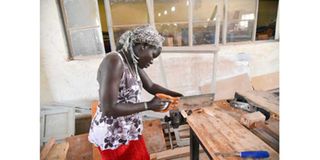Women in Kakuma camp take refuge in male-dominated jobs

Martha Naboin makes furniture at Don Bosco Technical Institute, Kakuma, on October 19, 2022.
What you need to know:
- Here, economic hardship forces many people to engage in drug abuse, alcoholism and early marriages as coping mechanisms.
- Some have become carpenters and their success is inspiring others to consider such ventures.
Perina Nahadishi was only six when she fled South Sudan to seek refuge at a sprawling Kakuma Refugee Camp in the company of her relatives.
Growing up as a young and naive girl with no clue of complexity of a new phase in her life, just like her age-mates, her dream was to become a successful pilot or doctor.
Now 23, she has been exposed to the living conditions of a camp located in the semi-arid Turkana West Sub-county. The region is barely tolerable due to harsh weather conditions, sub-standard housing and inadequate water and sanitation.
The economic hardship forces many people, including parents, here to engage in drug abuse, alcoholism and early marriages as coping mechanisms, hurting the upbringing of the little ones.
Dream deferred
Ms Nahadishi's innocent plans of easily securing her future through education were later halted when she fell pregnant while in Form Two at Kakuma Refugee Secondary School.
“I dropped out of school to give birth. At home, I didn't have someone to help me take care of the kid as I resume my education. The second pregnancy is what hit me hard. I was left on my own. My husband abandoned me," she tells Nation.Africa.
As a single parent, she was left with no option other than struggle to feed her two children. The free food rations refugees receive at the camp was not enough.
Lady luck smiled on her when she grabbed a free opportunity at Don Bosco Technical Institute, Kakuma, which, through integration, empowers the youth from the refugee camp and host community with knowledge and life skills.
“I challenged myself to study carpentry so that I can expand my knowledge and be able to lead a comfortable life even if it means doing jobs that are traditionally reserved for men, to fend for my children,” Ms Nahadishi says.
Income-generation
Through the training, she is now able to make tables, chairs and beds at the institution's workshop and earn a living.
“With support from my instructor and classmates, mostly men, I enjoy learning the skills. I see myself making the best furniture for my house and for sale so that I can buy food and other things to make my life comfortable,” she adds.
Studying the same course is Martha Naboin, 27. The mother of three dropped out of school in Class Seven. She says that although she lives with her siblings, the food rations the family of 15 people gets isn't enough.
“Some people say this course is only for men, I decided to take it so that with the skills, I open my own workshop, earn and even train other girls in the refugee camp. I can now make tables, doors and beds," Ms Naboin explains.
She says she was inspired by her friend, Ms Nahadishi, and her instructor to gain the skills needed to venture into specialised careers traditionally reserved for men.
Passion
Their instructor, Calvin Lianda, says the two women are passionate, explaining that their hard work and success will inspire other women to consider carpentry and other courses dominated by men.
“The most expensive piece of furniture the two ladies have made was a sofa we sold at Sh65,000,” Mr Lianda says.
The director of the Institute, Fr Jose Padintareparampil, says the institution encourages more women, especially from the host community, to embrace such technical courses because it partners with the government and gets support from various agencies, including the United Nations High Commissioner for Refugees and United Nations Women.
Fr Padintareparampil says there are seven training centres within the camp, with the main one located in Kakuma town. He prides himself on the fact that he saw the establishment of the camp and has witnessed the institution train thousands of young people, who, with the skills, have rebuilt their lives once repatriated to their countries of origin like Sudan, South Sudan, Burundi, DR Congo and Ethiopia.
“Every year, we reach out to more than 4,000 youth with different programmes under internal certification, Kenya National Examinations Council, Kenya Accountants and Secretaries National Examinations Board and National Industrial Training Authority. Through support from United Nations Women, a total of 250 youth are being trained,” he says.





